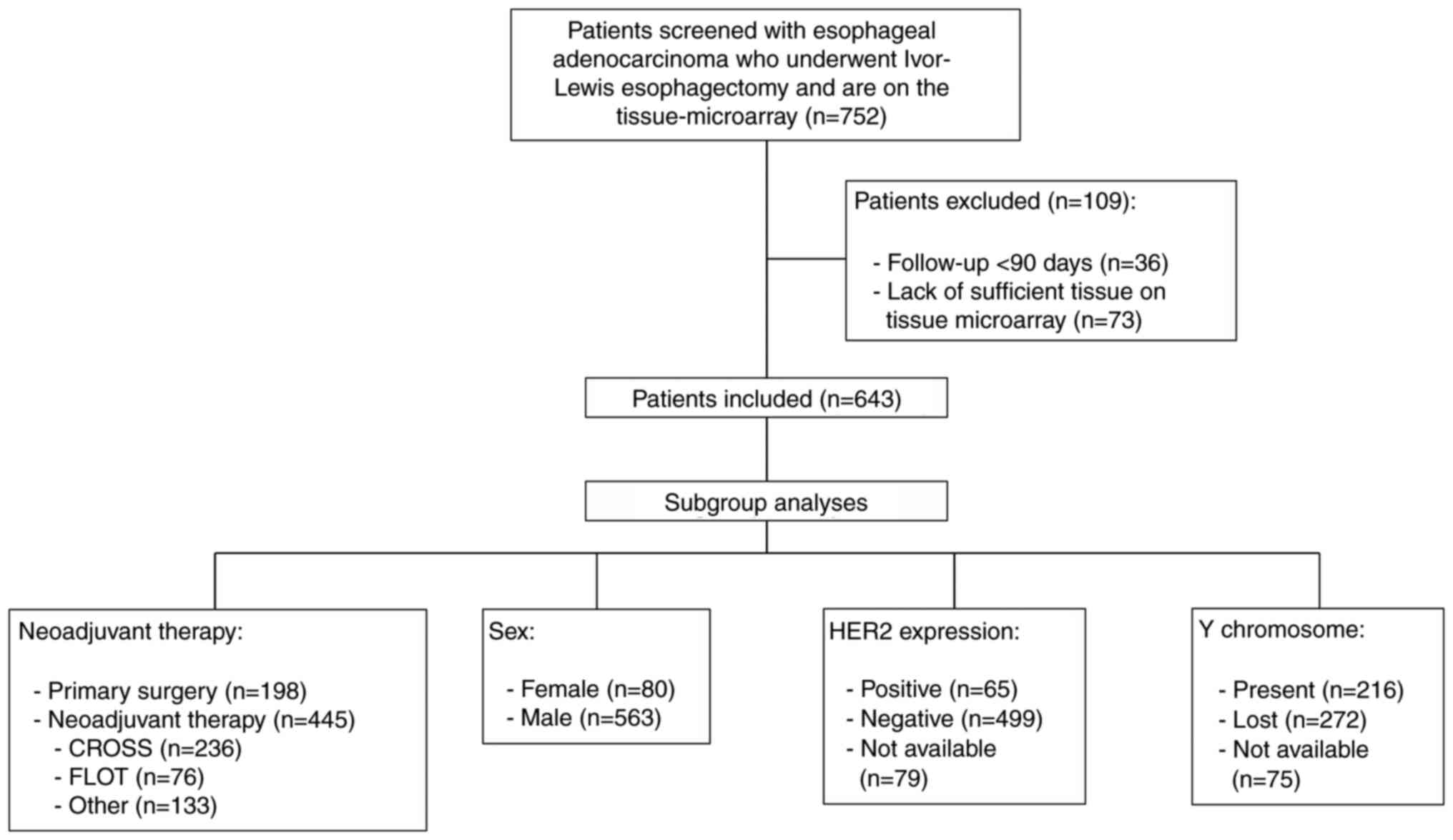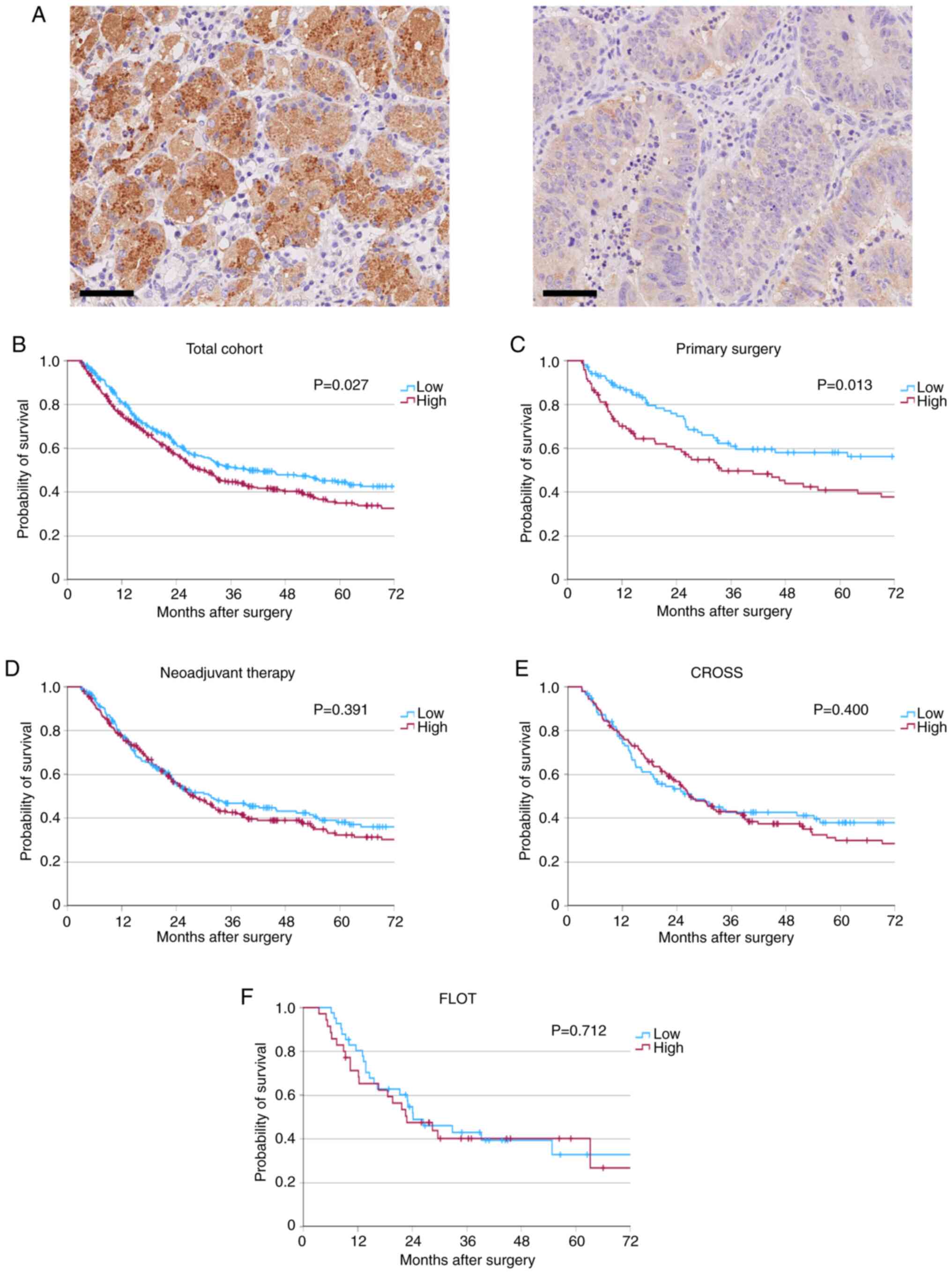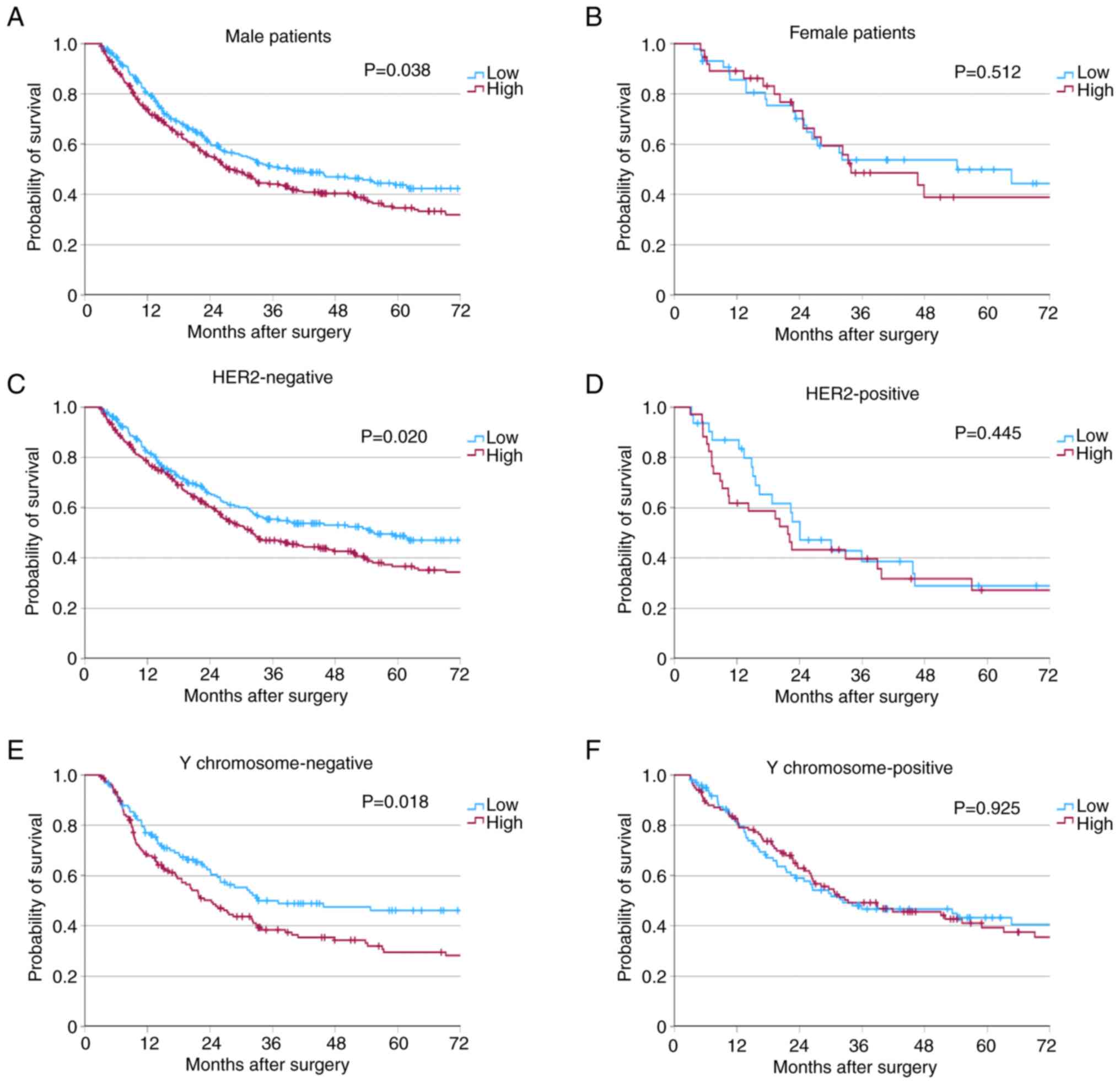|
1
|
Agarwal S, Bell MG, Dhaliwal L, Codipilly
DC, Dierkhising RA, Lansing R, Gibbons EE, Leggett CL, Kisiel JB
and Iyer PG: Population based time trends in the epidemiology and
mortality of gastroesophageal junction and esophageal
adenocarcinoma. Dig Dis Sci. 69:246–253. 2024. View Article : Google Scholar : PubMed/NCBI
|
|
2
|
Hanahan D and Weinberg RA: Hallmarks of
cancer: The next generation. Cell. 144:646–674. 2011. View Article : Google Scholar : PubMed/NCBI
|
|
3
|
Ganapathy-Kanniappan S and Geschwind JF:
Tumor glycolysis as a target for cancer therapy: Progress and
prospects. Mol Cancer. 12:1522013. View Article : Google Scholar : PubMed/NCBI
|
|
4
|
Li W, Xu Z, Hong J and Xu Y: Expression
patterns of three regulation enzymes in glycolysis in esophageal
squamous cell carcinoma: association with survival. Med Oncol.
31:1182014. View Article : Google Scholar : PubMed/NCBI
|
|
5
|
Irwin DM and Tan H: Molecular evolution of
the vertebrate hexokinase gene family: Identification of a
conserved fifth vertebrate hexokinase gene. Comp Biochem Physiol
Part D Genomics Proteomics. 3:96–107. 2008. View Article : Google Scholar : PubMed/NCBI
|
|
6
|
Wilson JE: Isozymes of mammalian
hexokinase: Structure, subcellular localization and metabolic
function. J Exp Biol. 206:2049–2057. 2003. View Article : Google Scholar : PubMed/NCBI
|
|
7
|
Van Schaftingen E: Hexokinase/glucokinase.
Encyclopedia of Biological Chemistry. Academic Press; London: pp.
543–547. 2013, View Article : Google Scholar
|
|
8
|
Guo C, Ludvik AE, Arlotto ME, Hayes MG,
Armstrong LL, Scholtens DM, Brown CD, Newgard CB, Becker TC, Layden
BT, et al: Coordinated regulatory variation associated with
gestational hyperglycaemia regulates expression of the novel
hexokinase HKDC1. Nat Commun. 6:60692015. View Article : Google Scholar : PubMed/NCBI
|
|
9
|
Shinohara Y, Yamamoto K, Kogure K,
Ichihara J and Terada H: Steady state transcript levels of the type
II hexokinase and type 1 glucose transporter in human tumor cell
lines. Cancer Lett. 82:27–32. 1994. View Article : Google Scholar : PubMed/NCBI
|
|
10
|
Li R, Mei S, Ding Q, Wang Q, Yu L and Zi
F: A pan-cancer analysis of the role of hexokinase II (HK2) in
human tumors. Sci Rep. 12:188072022. View Article : Google Scholar : PubMed/NCBI
|
|
11
|
Izuishi K, Yamamoto Y, Sano T, Takebayashi
R, Nishiyama Y, Mori H, Masaki T, Morishita A and Suzuki Y:
Molecular mechanism underlying the detection of colorectal cancer
by 18F-2-fluoro-2-deoxy-D-glucose positron emission tomography. J
Gastrointest Surg. 16:394–400. 2012. View Article : Google Scholar : PubMed/NCBI
|
|
12
|
Paudyal B, Oriuchi N, Paudyal P, Tsushima
Y, Higuchi T, Miyakubo M, Ishikita T, Nakajima T and Endo K:
Clinicopathological presentation of varying 18F-FDG uptake and
expression of glucose transporter 1 and hexokinase II in cases of
hepatocellular carcinoma and cholangiocellular carcinoma. Ann Nucl
Med. 22:83–86. 2008. View Article : Google Scholar : PubMed/NCBI
|
|
13
|
Wu J, Hu L, Wu F, Zou L and He T: Poor
prognosis of hexokinase 2 overexpression in solid tumors of
digestive system: A meta-analysis. Oncotarget. 8:32332–32344. 2017.
View Article : Google Scholar : PubMed/NCBI
|
|
14
|
Schreurs LMA, Smit JK, Pavlov K, Pultrum
BB, Pruim J, Groen H, Hollema H and Plukker JT: Prognostic impact
of clinicopathological features and expression of biomarkers
related to (18)F-FDG uptake in esophageal cancer. Ann Surg Oncol.
21:3751–3757. 2014. View Article : Google Scholar : PubMed/NCBI
|
|
15
|
von Elm E, Altman DG, Egger M, Pocock SJ,
Gotzsche PC and Vandenbroucke JP: The strengthening the reporting
of observational studies in epidemiology (STROBE) statement:
Guidelines for reporting observational studies. Lancet.
370:1453–1457. 2007. View Article : Google Scholar : PubMed/NCBI
|
|
16
|
Rous B, Asamura H, Van Eycken E and
Brierley JD: TNM atlas. 7th edition. Wiley-Blackwell; Hoboken, NJ:
2021
|
|
17
|
Loeser H, Waldschmidt D, Kuetting F, Heydt
C, Zander T, Plum P, Alakus H, Buettner R and Quaas A: Copy-number
variation and protein expression of DOT1L in pancreatic
adenocarcinoma as a potential drug target. Mol Clin Oncol.
6:639–642. 2017. View Article : Google Scholar : PubMed/NCBI
|
|
18
|
Mazières J, Brugger W, Cappuzzo F, Middel
P, Frosch A, Bara I, Klingelschmitt G and Klughammer B: Evaluation
of EGFR protein expression by immunohistochemistry using H-score
and the magnification rule: Re-analysis of the SATURN study. Lung
Cancer. 82:231–237. 2013. View Article : Google Scholar : PubMed/NCBI
|
|
19
|
Schiffmann LM, Loeser H, Jacob AS, Maus M,
Fuchs H, Zhao Y, Tharun L, Essakly A, Iannos Damanakis A, Zander T,
et al: Dickkopf-2 (DKK2) as context dependent factor in patients
with esophageal adenocarcinoma. Cancers (Basel). 12:4512020.
View Article : Google Scholar : PubMed/NCBI
|
|
20
|
Knipper K, Damanakis AI, Lyu SI, Simon AG,
Wahler I, Bruns CJ, Schröder W, Schmidt T and Quaas A: High NANOG
expression correlates with worse patients' survival in esophageal
adenocarcinoma. BMC Cancer. 23:6692023. View Article : Google Scholar : PubMed/NCBI
|
|
21
|
Loeser H, Wölwer CB, Alakus H, Chon SH,
Zander T, Buettner R, Hillmer AM, Bruns CJ, Schroeder W, Gebauer F
and Quaas A: Y chromosome loss is a frequent event in Barrett's
adenocarcinoma and associated with poor outcome. Cancers (Basel).
12:17432020. View Article : Google Scholar : PubMed/NCBI
|
|
22
|
Prins MJD, Ruurda JP, van Diest PJ, van
Hillegersberg R and Ten Kate FJW: The significance of the HER-2
status in esophageal adenocarcinoma for survival: An
immunohistochemical and an in situ hybridization study. Ann Oncol.
24:1290–1297. 2013. View Article : Google Scholar : PubMed/NCBI
|
|
23
|
Qiu MZ, Han B, Luo HY, Zhou ZW, Wang ZQ,
Wang FH, Li YH and Xu RH: Expressions of hypoxia-inducible
factor-1α and hexokinase-II in gastric adenocarcinoma: The impact
on prognosis and correlation to clinicopathologic features. Tumour
Biol. 32:159–166. 2011. View Article : Google Scholar : PubMed/NCBI
|
|
24
|
Sato-Tadano A, Suzuki T, Amari M, Takagi
K, Miki Y, Tamaki K, Watanabe M, Ishida T, Sasano H and Ohuchi N:
Hexokinase II in breast carcinoma: A potent prognostic factor
associated with hypoxia-inducible factor-1α and Ki-67. Cancer Sci.
104:1380–1388. 2013. View Article : Google Scholar : PubMed/NCBI
|
|
25
|
Obermannová R, Alsina M, Cervantes A,
Leong T, Lordick F, Nilsson M, van Grieken NCT, Vogel A and Smyth
EC; ESMO Guidelines Committee, : Electronic address: simpleclinicalguidelines@esmo.org:
Oesophageal cancer: ESMO clinical practice guideline for diagnosis,
treatment and follow-up. Ann Oncol. 33:992–1004. 2022. View Article : Google Scholar : PubMed/NCBI
|
|
26
|
Wagener-Ryczek S, Schoemmel M, Kraemer M,
Bruns C, Schroeder W, Zander T, Gebauer F, Alakus H,
Merkelbach-Bruse S, Buettner R, et al: Immune profile and
immunosurveillance in treatment-naive and neoadjuvantly treated
esophageal adenocarcinoma. Cancer Immunol Immunother. 69:523–533.
2020. View Article : Google Scholar : PubMed/NCBI
|
|
27
|
Fonteyne P, Casneuf V, Pauwels P, Van
Damme N, Peeters M, Dierckx R and Van de Wiele C: Expression of
hexokinases and glucose transporters in treated and untreated
oesophageal adenocarcinoma. Histol Histopathol. 24:971–977.
2009.PubMed/NCBI
|
|
28
|
Tohma T, Okazumi S, Makino H, Cho A,
Mochiduki R, Shuto K, Kudo H, Matsubara K, Gunji H and Ochiai T:
Relationship between glucose transporter, hexokinase and FDG-PET in
esophageal cancer. Hepatogastroenterology. 52:486–490.
2005.PubMed/NCBI
|
|
29
|
Li WC, Huang CH, Hsieh YT, Chen TY, Cheng
LH, Chen CY, Liu CJ, Chen HM, Huang CL, Lo JF and Chang KW:
Regulatory role of hexokinase 2 in modulating head and neck
tumorigenesis. Front Oncol. 10:1762020. View Article : Google Scholar : PubMed/NCBI
|
|
30
|
Zhang MX, Hua YJ, Wang HY, Zhou L, Mai HQ,
Guo X, Zhao C, Huang WL, Hong MH and Chen MY: Long-term prognostic
implications and therapeutic target role of hexokinase II in
patients with nasopharyngeal carcinoma. Oncotarget. 7:21287–21297.
2016. View Article : Google Scholar : PubMed/NCBI
|
|
31
|
Clark R and Lee SH: Anticancer properties
of capsaicin against human cancer. Anticancer Res. 36:837–843.
2016.PubMed/NCBI
|
|
32
|
Mao X, Zhu H, Luo D, Ye L, Yin H, Zhang J
and Zhang Y and Zhang Y: Capsaicin inhibits glycolysis in
esophageal squamous cell carcinoma by regulating hexokinase-2
expression. Mol Med Rep. 17:6116–6121. 2018.PubMed/NCBI
|
|
33
|
Walenta S, Wetterling M, Lehrke M,
Schwickert G, Sundfør K, Rofstad EK and Mueller-Klieser W: High
lactate levels predict likelihood of metastases, tumor recurrence,
and restricted patient survival in human cervical cancers. Cancer
Res. 60:916–921. 2000.PubMed/NCBI
|
|
34
|
Pantziarka P, Sukhatme V, Bouche G, Meheus
L and Sukhatme VP: Repurposing drugs in oncology (ReDO)-diclofenac
as an anti-cancer agent. Ecancermedicalscience. 10:6102016.
View Article : Google Scholar : PubMed/NCBI
|
|
35
|
Chirasani SR, Leukel P, Gottfried E,
Hochrein J, Stadler K, Neumann B, Oefner PJ, Gronwald W, Bogdahn U,
Hau P, et al: Diclofenac inhibits lactate formation and efficiently
counteracts local immune suppression in a murine glioma model. Int
J Cancer. 132:843–853. 2013. View Article : Google Scholar : PubMed/NCBI
|
|
36
|
Liu XS, Liu JM, Chen YJ, Li FY, Wu RM, Tan
F, Zeng DB, Li W, Zhou H, Gao Y and Pei ZJ: Comprehensive analysis
of hexokinase 2 immune infiltrates and m6A related genes in human
esophageal carcinoma. Front Cell Dev Biol. 9:7158832021. View Article : Google Scholar : PubMed/NCBI
|
|
37
|
Suh DH, Kim MA, Kim H, Kim MK, Kim HS,
Chung HH, Kim YB and Song YS: Association of overexpression of
hexokinase II with chemoresistance in epithelial ovarian cancer.
Clin Exp Med. 14:345–353. 2014. View Article : Google Scholar : PubMed/NCBI
|
|
38
|
Al-Batran SE, Hartmann JT, Hofheinz R,
Homann N, Rethwisch V, Probst S, Stoehlmacher J, Clemens MR,
Mahlberg R, Fritz M, et al: Biweekly fluorouracil, leucovorin,
oxaliplatin, and docetaxel (FLOT) for patients with metastatic
adenocarcinoma of the stomach or esophagogastric junction: A phase
II trial of the arbeitsgemeinschaft internistische onkologie. Ann
Oncol. 19:1882–1887. 2008. View Article : Google Scholar : PubMed/NCBI
|
|
39
|
Eyck BM, van Lanschot JJB, Hulshof MCCM,
van der Wilk BJ, Shapiro J, van Hagen P, van Berge Henegouwen MI,
Wijnhoven BPL, van Laarhoven HWM, Nieuwenhuijzen GAP, et al:
Ten-year outcome of neoadjuvant chemoradiotherapy plus surgery for
esophageal cancer: The randomized controlled CROSS trial. J Clin
Oncol. 39:1995–2004. 2021. View Article : Google Scholar : PubMed/NCBI
|

















